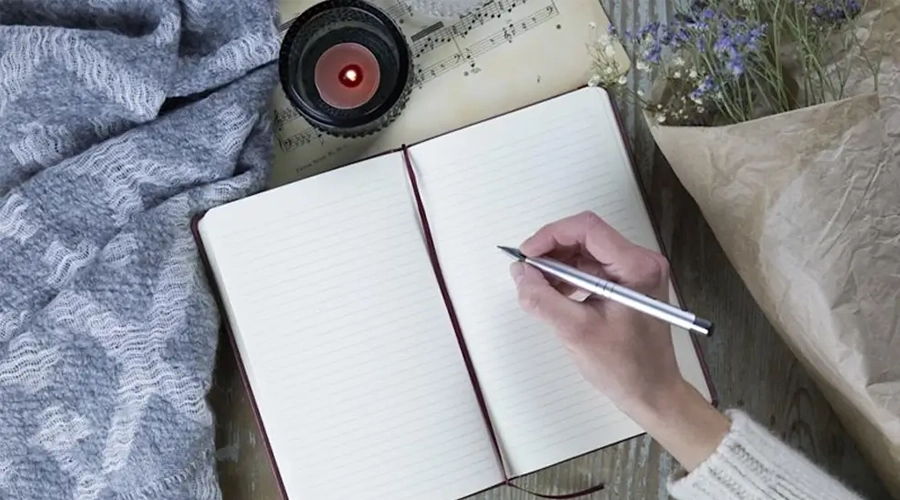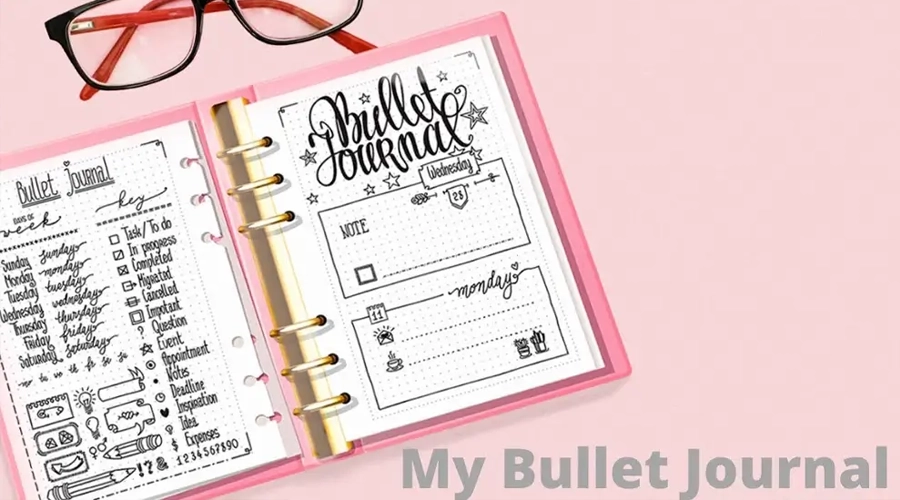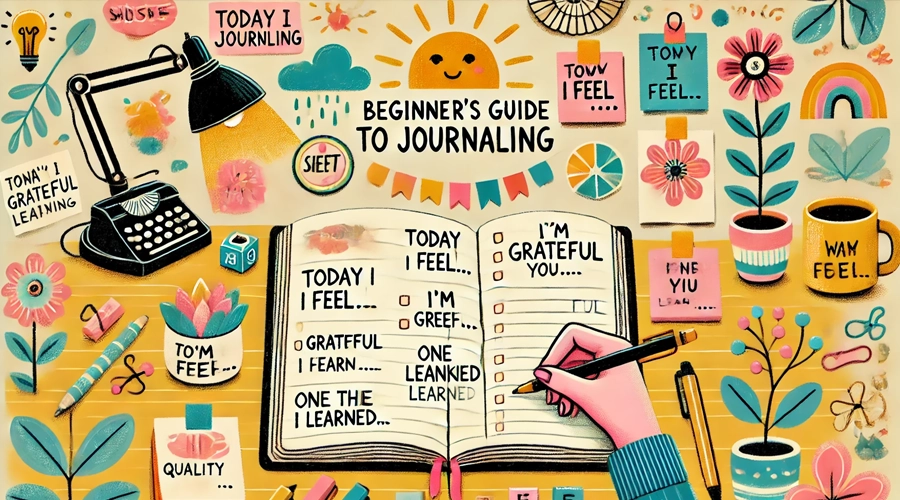Have you ever felt overwhelmed by your thoughts, unsure of how to process emotions, or simply wished for a way to organize your ideas? That’s where start journaling comes in. More than just putting words on paper, journaling is a powerful tool for mental clarity, self-reflection, and personal growth. It helps you untangle complex emotions, track progress, and gain a deeper understanding of yourself.
Many people hesitate to begin because they believe journaling for beginners is difficult or that they need to be a skilled writer to do it. But here’s the truth: journaling is not about perfect grammar, elegant prose, or writing long essays. It’s about creating a space where your thoughts can flow freely without judgment. Whether it’s a single sentence, a list of emotions, or a stream of consciousness, every entry serves as a step toward self-awareness.
By starting journaling, you open the door to personal insights, reduced stress, and a more intentional life. So, if you’ve been thinking about picking up a journal but aren’t sure where to begin, don’t worry. This guide will walk you through everything you need to know to build a sustainable and meaningful journaling habit. Let’s get started!
Why Should You Start Journaling?
Finding a moment of clarity amidst the chaos of daily life can be challenging. One powerful yet simple practice that helps organize thoughts, process emotions, and foster self-awareness is to start journaling. Whether you seek a creative space, a stress-relief method, or a tool for tracking personal growth, journaling for beginners provides countless benefits that can positively impact your life. 
Mental and Emotional Benefits – One of the biggest reasons to start journaling is its impact on mental health. Writing down your thoughts helps declutter your mind, reduce stress, and make sense of overwhelming emotions. By regularly expressing your feelings, you gain better emotional awareness and develop a healthier way to process challenges.
Boosting Creativity and Problem-Solving – Some of the most innovative thinkers and artists have used journaling to capture ideas, explore new perspectives, and spark creativity. When you write freely, without judgment, your mind becomes more open to new possibilities, helping you generate fresh ideas and find creative solutions to problems.
Tracking Progress and Setting Clear Goals – If you want to see how far you’ve come, start journaling to track your personal or professional progress. Writing about your goals not only makes them feel more tangible but also helps you stay accountable. By reviewing past entries, you can identify patterns, celebrate achievements, and adjust your path when necessary.
No matter your reason for journaling for beginners, the key is to just start. Your journal is a safe space—a place where you can express yourself freely, document your journey, and gain insight into your thoughts and emotions.
Choosing the Right Journaling Method
When you start journaling, selecting the right method can make the process more enjoyable and effective. There’s no one-size-fits-all approach—your journaling style should fit your personality, goals, and lifestyle. If you’re unsure where to begin, exploring different techniques can help you discover what works best for you. Here are some popular journaling for beginners methods to consider:
Bullet Journaling – A structured approach that combines organization and creativity. It’s perfect for task management, habit tracking, and setting goals. If you like lists and visual planning, this method can be a great fit.
Free Writing – A completely unstructured style where you write whatever comes to mind, without worrying about grammar or format. This technique is ideal for emotional expression, self-discovery, and clearing mental clutter.
Gratitude Journaling – A simple but powerful practice that focuses on writing down things you’re grateful for each day. It helps shift your mindset toward positivity and appreciation.
Digital vs. Physical Journaling – Choosing between a notebook and a digital journal depends on your preferences:
- Physical Journaling – Writing by hand can feel more personal and immersive. It also helps with memory retention and reducing screen time.
- Digital Journaling – Apps and online platforms make it easy to organize and search entries, especially if you like to type quickly or prefer accessibility on multiple devices.

How to Find the Right Journaling Style for You?
- Consider your goals: Do you want to track productivity, express emotions, or practice mindfulness?
- Think about your routine: If you prefer writing on the go, a digital journal might be more convenient. If you enjoy slowing down, a notebook might suit you better.
- Experiment: Try different methods for a few days and see which one feels the most natural.
Overcoming Common Barriers to Journaling
Starting a new habit isn’t always easy, and many people face obstacles when they start journaling. Whether it’s a lack of time, uncertainty about what to write, or difficulty staying consistent, these challenges can make journaling feel overwhelming. However, with the right mindset and strategies, you can easily overcome them. Here’s how to break through the most common barriers in journaling for beginners:
“I don’t have time” → How to fit journaling into your routine One of the biggest misconceptions about start journaling is that it requires a lot of time. The truth is, even a few minutes a day can make a difference. Here’s how to make journaling effortless:
- Keep it short – A few sentences or bullet points are enough.
- Attach it to an existing habit – Write right after your morning coffee or before bed.
- Use voice-to-text apps – If you don’t have time to write, dictate your thoughts instead.

“I don’t know what to write” → Prompts to kickstart your journaling habit It’s normal to feel stuck when you first start journaling, but structured prompts can help get the words flowing. Try these to get started:
- “What’s one thing I learned today?”
- “How am I feeling right now, and why?”
- “What’s one goal I want to accomplish this week?” The key is to remind yourself that journaling is a personal space—there’s no right or wrong way to do it!
“I can’t be consistent” → Simple tricks to stay on track Many beginners struggle with consistency, but small adjustments can make journaling for beginners a lasting habit:
- Set a reminder – Use your phone or a sticky note to prompt daily journaling.
- Make it enjoyable – Use a notebook or an app you love, and create a cozy writing environment.
- Forgive yourself for missed days – If you skip a day, don’t quit. Just pick up where you left off.
The best way to start journaling is to remove pressure and allow yourself to enjoy the process. Whether you write every day or a few times a week, the most important thing is to keep going.
How to Build a Sustainable Journaling Habit?
Developing a consistent journaling practice doesn’t have to be overwhelming. The key to making it a long-term habit is to keep it simple, enjoyable, and seamlessly integrated into your daily routine. Whether you’re new to start journaling or looking for ways to stay consistent, here’s how to build a habit that lasts.
Setting Realistic Goals One of the biggest mistakes journaling for beginners make is setting unrealistic expectations. You don’t need to write pages every day—small steps matter!
- 5-minute journaling – Dedicate just five minutes a day to writing a few thoughts.
- Morning pages – Write three unfiltered pages every morning to clear your mind.
- One-sentence journaling – If you’re short on time, simply jot down one meaningful sentence per day.
Creating a Journaling Ritual: Finding Your Perfect Time and Space Habits stick when they feel natural and rewarding. Finding the right time and space for start journaling can make it effortless.
- Pick a time that works for you – Some people prefer journaling in the morning to set intentions, while others do it at night to reflect on their day.
- Create a dedicated space – A cozy corner with a notebook or a distraction-free digital space can make journaling feel like a ritual.
- Pair it with an enjoyable activity – Light a candle, sip coffee, or play soft music while writing to make it a pleasant experience.
Leveraging Habit-Stacking to Make It Effortless Habit-stacking is a powerful technique to incorporate journaling for beginners into your routine without resistance. The idea is simple: attach your journaling habit to an existing habit.
- After brushing your teeth → Write one sentence in your journal.
- While drinking coffee → Jot down three things you’re grateful for.
- Before sleeping → Reflect on one highlight of your day.
By making journaling a natural extension of your daily habits, you’ll find it easier to stay consistent. The goal isn’t perfection—it’s progress. Start small, be flexible, and enjoy the process!
Creative Prompts to Spark Your Journaling Journey
Finding inspiration when you start journaling can sometimes feel challenging, especially if you’re unsure what to write. The good news is that journaling doesn’t have to be complicated—using prompts can help guide your thoughts and make writing effortless. Whether you’re looking for self-reflection, goal-setting, or emotional awareness, these prompts can help journaling for beginners feel more natural and meaningful. 
Reflective Prompts for Self-Awareness Understanding yourself better is one of the most powerful benefits of start journaling. These prompts help you explore your thoughts, emotions, and personal growth:
- What’s one lesson I’ve learned recently that has changed my perspective?
- How do I define success, and has that definition evolved over time?
- What are three qualities I admire in myself, and how do they shape my daily life?
- What’s something I’ve been avoiding, and why?
Productivity-Focused Prompts for Goal Setting Journaling is a great way to clarify your goals and track progress. These prompts help you stay focused and motivated:
- What’s one small step I can take today toward my biggest goal?
- Where do I see myself in a year, and what actions will get me there?
- What’s a habit I want to build, and what challenges might I face along the way?
- What’s one thing I accomplished recently that I’m proud of?
Emotional Check-Ins to Track Mood and Growth Keeping track of your emotions can help you identify patterns, manage stress, and cultivate self-compassion. Use these prompts to check in with yourself:
- How am I feeling right now, and what might be causing this emotion?
- What’s been draining my energy lately, and how can I restore it?
- What’s one positive thing that happened today, no matter how small?
- How do I respond to stress, and what strategies help me stay balanced?
Conclusion: Just Start and Let Your Thoughts Flow
Journaling is not about perfection—it’s about self-expression, self-discovery, and growth. There’s no right or wrong way to do it, and your journal is your personal space where you can be completely honest with yourself. Whether you prefer structured bullet points, free-flow writing, or simple daily reflections, what matters most is that you start journaling in a way that feels natural to you.
If you’ve been waiting for the perfect moment to begin, this is it. Don’t overthink it—just grab a notebook or open a digital journal and write your first entry, even if it’s just a single sentence. It doesn’t have to be perfect; it just has to be yours. Journaling for beginners is about taking that first step, no matter how small.
So, here’s a challenge: Write your first journal entry today. Reflect on your thoughts, set an intention, or simply describe how you feel right now. Once you start, you’ll realize how powerful this simple habit can be. Transform Your Writing Experience! Get the VerboAI APK and explore intelligent journaling now.



